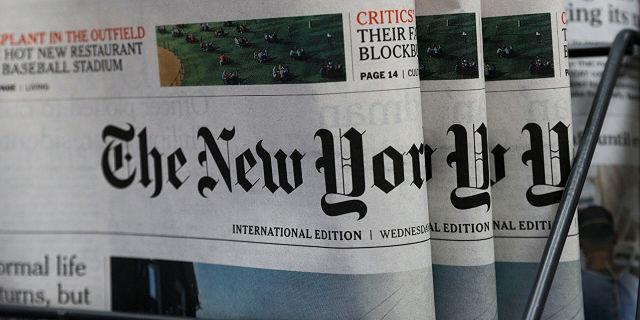Fatal mistake: what the US wrote about NATO expansion in 1997The decision to expand NATO to Russia's borders could inflame nationalist, anti-Western and militaristic sentiments in the country's public opinion and lead its foreign policy in a direction decidedly unfavorable for the United States, American diplomat George Kennan wrote in the New York Times in 1997.
This article was published in the New York Times in 1997 — approx. InoSMIGeorge Kennan
At the end of 1996, it was allowed, or deliberately promoted, the spread of sentiments that once and somehow a decision was made to expand NATO to the borders of Russia, despite the fact that it could only be officially adopted at the upcoming alliance summit in June.
This revelation, which coincided with the presidential election and the subsequent changes in the composition of key people in Washington, did not allow an outsider to understand where and when to insert his modest comment. He was also not inspired by the assurances that this decision, no matter how preliminary it was, was irrevocable.
However, there is something of critical importance at stake here. And, perhaps, it is not too late to promote the opinion, which, I am sure, is held not only by me alone, but also by many other people who have extensive and in many ways quite fresh experience of relations with Russia. This is the idea, if we talk directly, that the expansion of NATO will be the most fatal mistake of American policy for the entire period after the Cold War.
Such a decision could inflame nationalist, anti-Western and militaristic sentiments in Russia's public opinion and lead its foreign policy in a direction decidedly unfavorable for us. Last but not least, it would greatly complicate, if not make it impossible, the ratification by the State Duma of the START II Treaty and further steps in the reduction of nuclear weapons.
It is regrettable, of course, that Russia will have to respond to this challenge at a time when its executive power is in a state of high uncertainty and is almost paralyzed. This is doubly unfortunate, given the absolute lack of necessity forcing such a step. Why, with all the opportunities and hopes born with the end of the Cold war, the relations of the West and the East should be reduced to the question of who and with whom to conclude alliances, and — implying some fantastic and incredible future military conflict - against whom?
Of course, I know that NATO is negotiating with the Russian authorities — in the hope of presenting the idea of expansion acceptable, tolerable for Russia. One can only wish success in these efforts. But anyone who carefully studies the Russian press cannot fail to notice that neither the Russian government nor society is waiting for the proposed expansion to take place before responding to it.
The Russians are extremely unimpressed by the alliance's assurances that there are no hostile intentions. They see this as a threat to their prestige (and this is a matter of paramount importance for them) and to their security interests. They, of course, will have no choice but to perceive the expansion as a military fait accompli. But they will continue to consider this an act of gross disregard on the part of the West and, most likely, will look somewhere else for guarantees for their reliable and secure future.
It will obviously not be easy to reverse the decision already made — or tacitly accepted — by the 16 NATO members. But there are still a few months before it becomes final; perhaps this period can be used to change the decision on the proposed expansion in such a way as to minimize the adverse impact that it already has on Russian society and politics.
George Kennan is an American diplomat, political scientist and historian. The eighth U.S. Ambassador to the USSR. He is best known as the "architect of the Cold War", the ideological father of the "containment policy" and the Truman doctrine. Author of works on the history of relations between Russia and Western countries.

